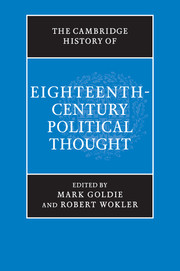Book contents
- Frontmatter
- Introduction
- Part I The ancien régime and its critics
- Part II The new light of reason
- Part III Natural jurisprudence and the science of legislation
- Part IV Commerce, luxury, and political economy
- 13 The early Enlightenment debate on commerce and luxury
- 14 Physiocracy and the politics of laissez-faire
- 15 Scottish political economy
- 16 Property, community, and citizenship
- Part V The promotion of public happiness
- Part VI The Enlightenment and revolution
- Biographies
- Bibliography
- Index
- References
14 - Physiocracy and the politics of laissez-faire
from Part IV - Commerce, luxury, and political economy
Published online by Cambridge University Press: 28 March 2008
- Frontmatter
- Introduction
- Part I The ancien régime and its critics
- Part II The new light of reason
- Part III Natural jurisprudence and the science of legislation
- Part IV Commerce, luxury, and political economy
- 13 The early Enlightenment debate on commerce and luxury
- 14 Physiocracy and the politics of laissez-faire
- 15 Scottish political economy
- 16 Property, community, and citizenship
- Part V The promotion of public happiness
- Part VI The Enlightenment and revolution
- Biographies
- Bibliography
- Index
- References
Summary
Physiocracy in its historical, intellectual, and political setting
Physiocracy, or ‘rule of nature’, was a largely, but not exclusively, French movement in political economy that prioritised agricultural productivity over manufacturing as the source of economic growth, and sought to move on from that analysis to provide a fresh model of the fiscal and administrative relationships that should operate between royal governments and the owners of property broadly defined. It exercised intermittent influence on French administrations between the 1760s and 1780s and furthermore attracted vehement supporters and opponents outside France, especially in Italy and Spain, but also as far afield as the United States and Bengal.
However, physiocracy has not habitually been associated with innovative political theory, or indeed with any coherent political theory at all. From the days of early commentators such as the Abbé Galiani, Adam Smith, and, later, Jean Baptiste Say, it became conventional to argue that French physiocracy was mistaken in its economics and inept in its politics, partial in its understanding of the mechanisms of wealth creation, and ineffective in making its case before both the tribunal of emerging French public opinion and across the shoals of court politics. The first part of this condemnation, though not perhaps the most important in the eyes of contemporaries, has been conventionally turned into a textbook account, conveniently summarised by Robert Heilbroner in the following terms:
The trouble with physiocracy was that it insisted that only the agricultural classes produced true ‘wealth’ and that the manufacturing and commercial classes merely manipulated it in a sterile way. Hence Quesnay’s system had but limited usefulness for practical policy. True it advocated a policy of laissez-faire – a radical departure for the times. But in denigrating the industrial side of life it flew against the sense of history, for the whole development of capitalism unmistakably pointed to the emergence of the industrial classes to a position of superiority over the landed classes. (Heilbroner 1961, p42)
- Type
- Chapter
- Information
- The Cambridge History of Eighteenth-Century Political Thought , pp. 419 - 442Publisher: Cambridge University PressPrint publication year: 2006
References
- 3
- Cited by

